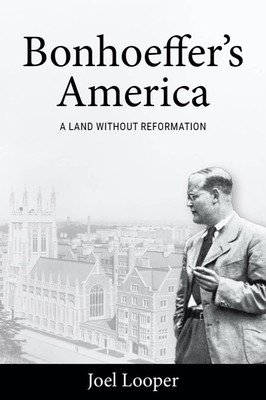
- We will send in 10–14 business days.
- Author: Joel Looper
- Publisher: Baylor University Press
- ISBN-10: 1481314513
- ISBN-13: 9781481314510
- Format: 19.6 x 23.4 x 2.5 cm, kieti viršeliai
- Language: English
- SAVE -10% with code: EXTRA
Reviews
Description
In the 1930s, Dietrich Bonhoeffer came to Union Theological Seminary looking for a "cloud of witnesses." What he found instead disturbed, angered, and perplexed him. "There is no theology here," he wrote to a German colleague. The New York churches, if possible, were even worse: "They preach about virtually everything; only one thing is not addressed... namely, the gospel of Jesus Christ, the cross, sin and forgiveness, death and life." Bonhoeffer acts for American Protestantism as an Alexis de Tocqueville, whose Democracy in America, a cultural and political analysis of the new republic, appeared a century prior. But what the Berlin theologian found was, if possible, more significant than the observations of the French aristocrat: Protestantism in America was a "Protestantism without Reformation."
Bonhoeffer's America explicates these criticisms, then turns to consider what they tell us about Bonhoeffer's own theological commitments and whether, in fact, his judgments about America were accurate. Joel Looper first brings Bonhoeffer's reformational and Barthian commitments into relief against the work of several Union theologians and the broader American theological milieu. He then turns to Bonhoeffer's own genealogy of American Protestantism to explore why it developed as it did: steeped in dissenting influences, the American church became one that resisted critique by the word of God. American Protestantism is not Protestant, Bonhoeffer shows us, not like the churches that emerged from the Continental Reformation. This difference gave rise to the secularization of the American church.
Bonhoeffer's claims against the church in the United States, Looper contends, hold strong, even after considering objections to this narrative--Bonhoeffer's experience with Abyssinian Baptist Church in Harlem, and the possibility that Bonhoeffer, during his time in Tegel Prison, abandoned the theological commitments that undergirded his critique. Bonhoeffer's America concludes that what Bonhoeffer saw in America, the twenty-first-century American church should strive to see for itself.
EXTRA 10 % discount with code: EXTRA
The promotion ends in 21d.16:57:38
The discount code is valid when purchasing from 10 €. Discounts do not stack.
- Author: Joel Looper
- Publisher: Baylor University Press
- ISBN-10: 1481314513
- ISBN-13: 9781481314510
- Format: 19.6 x 23.4 x 2.5 cm, kieti viršeliai
- Language: English English
In the 1930s, Dietrich Bonhoeffer came to Union Theological Seminary looking for a "cloud of witnesses." What he found instead disturbed, angered, and perplexed him. "There is no theology here," he wrote to a German colleague. The New York churches, if possible, were even worse: "They preach about virtually everything; only one thing is not addressed... namely, the gospel of Jesus Christ, the cross, sin and forgiveness, death and life." Bonhoeffer acts for American Protestantism as an Alexis de Tocqueville, whose Democracy in America, a cultural and political analysis of the new republic, appeared a century prior. But what the Berlin theologian found was, if possible, more significant than the observations of the French aristocrat: Protestantism in America was a "Protestantism without Reformation."
Bonhoeffer's America explicates these criticisms, then turns to consider what they tell us about Bonhoeffer's own theological commitments and whether, in fact, his judgments about America were accurate. Joel Looper first brings Bonhoeffer's reformational and Barthian commitments into relief against the work of several Union theologians and the broader American theological milieu. He then turns to Bonhoeffer's own genealogy of American Protestantism to explore why it developed as it did: steeped in dissenting influences, the American church became one that resisted critique by the word of God. American Protestantism is not Protestant, Bonhoeffer shows us, not like the churches that emerged from the Continental Reformation. This difference gave rise to the secularization of the American church.
Bonhoeffer's claims against the church in the United States, Looper contends, hold strong, even after considering objections to this narrative--Bonhoeffer's experience with Abyssinian Baptist Church in Harlem, and the possibility that Bonhoeffer, during his time in Tegel Prison, abandoned the theological commitments that undergirded his critique. Bonhoeffer's America concludes that what Bonhoeffer saw in America, the twenty-first-century American church should strive to see for itself.


Reviews